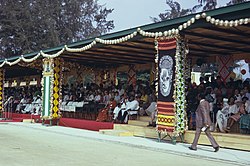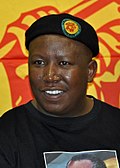IntroductionWelcome to the Pan-Africanism portal!
Bienvenue sur le portail panafricanisme!    Pan-Africanism is a nationalist movement that aims to encourage and strengthen bonds of solidarity between all indigenous peoples and diasporas of African ancestry. Based on a common goal dating back to the Atlantic slave trade and the Trans-Saharan slave trade, the movement extends beyond continental Africans with a substantial support base among the African diaspora in the Americas and Europe. Pan-Africanism is said to have its origins in the struggles of the African people against enslavement and colonization and this struggle may be traced back to the first resistance on slave ships—rebellions and suicides—through the constant plantation and colonial uprisings and the "Back to Africa" movements of the 19th century. Based on the belief that unity is vital to economic, social, and political progress, it aims to "unify and uplift" people of African ancestry. (Full article...) Selected articleThe Organisation of African Unity (OAU; French: Organisation de l'unité africaine (OUA)) was established on 25 May 1963 in Addis Ababa, Ethiopia with 32 signatory governments. It was disbanded on 9 July 2002 by its last chairperson, South African President Thabo Mbeki, and replaced by the African Union (AU). Some of the key aims of the OAU were to encourage political and economic integration among member states, and to eradicate colonialism and neo-colonialism from the African continent. Although it did achieve some success, there were also differences of opinion as to how that was going to be achieved. Selected biographyMusa Ngum (or Musa Afia Ngum, born 1953 in Fatoto, the Gambia; died 11 October 2015 at the Dantec Hospital, Dakar, Senegal) was a singer and songwriter who was very popular in Senegal and Gambia. He was one of the pioneers of mbalax music, and "helped to define the mbalax style of popular music in the Senegambia" and "had a strong influence on Youssou N'Dour and other mbalax pioneers". He was "something of a cult icon back in the Senegambia region, and a pioneer of the mbalax fusion style". The mbalax, which originated from the Serer religious and ultra–conservative njuup music tradition sang during Ndut rites by circumcised boys (also referred to as “Kassak” songs) was the foundation of Ngum's music career. He mastered many of the njuup classics and built a name for himself whilst at the same time developing his voice. Throughout his music career, Ngum advocated for Pan-Africanism, and in particular the unification of Senegal and Gambia under one president. Selected history The Arab slave trade was the intersection of slavery and trade in the Arab world, mainly in Western Asia, North Africa, East Africa and Europe. This barter occurred chiefly between the medieval era and the early 20th century. The trade was conducted through slave markets in these areas, with the slaves captured mostly from Africa's interior and Southern Europe. Selected culture
Haitian Vodou (/ˈvoʊduː/, French: [vodu], also written as Vaudou /ˈvoʊduː/; known commonly as Voodoo /ˈvuːduː/, sometimes as Vodun /ˈvoʊduː/, Vodoun /ˈvoʊduːn/, Vodu /ˈvoʊduː/, or Vaudoux /ˈvoʊduː/) is a syncretic religion practiced chiefly in Haiti and the Haitian diaspora. Practitioners are called "vodouists" (French: vodouisants [voduizɑ̃]) or "servants of the spirits" (Haitian Creole: sèvitè). Vodouists believe in a distant and unknowable Supreme Creator, Bondye (derived from the French term Bon Dieu, meaning "good God"). According to Vodouists, Bondye does not intercede in human affairs, and thus they direct their worship toward spirits subservient to Bondye, called loa. Every loa is responsible for a particular aspect of life, with the dynamic and changing personalities of each loa reflecting the many possibilities inherent to the aspects of life over which they preside. To navigate daily life, vodouists cultivate personal relationships with the loa through the presentation of offerings, the creation of personal altars and devotional objects, and participation in elaborate ceremonies of music, dance, and spirit possession. Vodou originated in what is now Benin Republic and developed in the French colonial empire in the 18th century among West African peoples who were enslaved, when African religious practice was actively suppressed, and enslaved Africans were forced to convert to Christianity. Religious practices of contemporary Vodou are descended from, and closely related to, West African Vodun as practiced by the Fon and Ewe. Vodou also incorporates elements and symbolism from other African peoples including the Yoruba and Kongo; as well as Taíno religious beliefs, Roman Catholicism, and European spirituality including mysticism and other influences. Selected imagesOrganisationsAll-African People's Revolutionary Party · African Society for Cultural Relations with Independent Africa · African Unification Front · African Union · African Queens and Women Cultural Leaders Network · Conseil de l'Entente · Convention People's Party · East African Community · Economic Freedom Fighters · Global Afrikan Congress · International African Service Bureau · International League for Darker People · Organisation of African Unity · Pan African Association · Pan-African Congress · Pan Africanist Congress of Azania · Rassemblement Démocratique Africain · Pan Africa Chemistry Network · Pan African Federation of Accountants · Pan-African Freedom Movement for East and Central Africa · Sahara and Sahel Observatory · UNIA-ACL · ZANU–PF
See also
& Festivals Photo by Helinä Rautavaara (1977) Publications
Films and TVAudios and videosDid you knowArchbishop Desmond Tutu and Thabo Mbeki, former President of South Africa. ... Selected quotesIn his "Whirlwind Message", the First Message to the Negroes of the World from Atlanta Prison (10 February 1925), Marcus Garvey delivered the following message:
Pan-Africanism topicsCategoriesThings you can do
Related portalsAssociated WikimediaThe following Wikimedia Foundation sister projects provide more on this subject:
Discover Wikipedia using portals | ||||||||||||||||||
© MMXXIII Rich X Search. We shall prevail. All rights reserved. Rich X Search

































